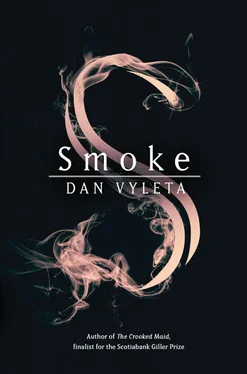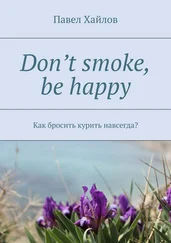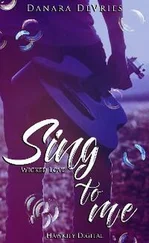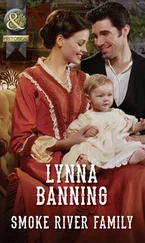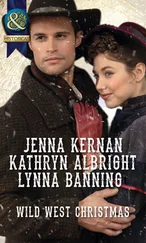He distributes copies of the list to Thomas and Julius, then lingers at the head boy’s side.
“One more thing, Mr. Spencer. These midnight examinations. They will stop. I alone have the authority to examine the pupils at this school.”
Swinburne is too outraged to swallow his anger. “The school has its traditions. Only a fool meddles with—”
Renfrew cuts him off. His tone, now, is cold and brutal.
“A new era is dawning, Master Swinburne. You’d better get used to it.”
He gestures the two boys up and all but pushes them out the door. Outside, in the hallway, Thomas and Julius stop for a moment, dazed. For an instant something like companionship flickers between them, the sense that they have shared a danger, and survived. Then Julius straightens.
“I hate you,” he says and walks away. Not the slightest trace of Smoke rises from his skin. It leaves Thomas wondering what it is about Julius’s hate that is sanctified, and what is so dirty about his own.
ф
“There you are! I’ve been looking all over.”
Charlie corners him just before lights-out. That’s the thing about school: no matter how big it is, there is no place to hide. Each nook, each hour is supervised. Empty rooms are locked and the hallways swarm with boys; porters in the stairwells, and outside it’s too bloody cold.
“They say there’s been a tribunal. In Trout’s office.”
“Yes.”
Charlie starts to say something, swallows it, looks him full in the face. His eyes are so full of care for him, it frightens Thomas.
“What did they do to you?”
“Nothing.”
“Are you sure?”
“Yes.”
Because how can Thomas tell him? That he’s infected . That there is an evil growing in him, so dark and ugly it frightens Renfrew. That one day he will wake up and do something unspeakable. That crime runs in his family.
That he is a dangerous friend to have.
So he says, “They are letting me join the Trip.” And also: “The delivery arrived. The thing they have been waiting for. Cruikshank came and told them.”
Charlie hoots when he hears about the Trip, from relief and from happiness that they’ll be going together. It’s a joy so simple and pure, it makes Thomas ashamed before his friend. He might have apologised — confessed — had not Charlie put a hand on his arm and said, “Let’s go see him. Cruikshank. We have a few minutes.”
He starts running, tugging Thomas along.
“He likes me, Cruikshank does. I chat to him from time to time. He’ll tell me what it is.”
And as they race down the stairs, their feet clattering, each matching the other’s stride, Thomas forgets, almost, that he is a sick boy, a walking blight, the son of a man who has killed.
Two boys. They come to me with questions. One who strips the truth off things like he’s made of turpentine, and the other with eyes so frank, it inclines you to confession. I talk to the second, naturally, though I keep track of the first. He’s the type you don’t want sneaking up on you from behind.
“The deliv’ry?” I ask, like I don’t quite recall. It’s how you survive in this world. Play dumb, thicken your accent. Makes you invisible: one look and they dismiss you from their minds. The powers that be. But not these boys. Smarter than their teachers, they are. They simply wait me out.
“Oh, nothin’ special,” I say at last. “Sweets, you know. Tea. Biscuits. From someplace in London.”
That’s all I give them, that and the name, to see how they react.
“Nice big stamp on the crate. Beasley and Son. Impor’ and Expor’, Deliv’ries to the Crown.”
They don’t bat an eyelid, not one of them. Innocents, then. Though the quiet one looks like he was born with a knife in his fist. Like he had to cut his way out, and didn’t much mind.
“You goin’ on the Trip, t’morrow, lads?” I ask, though of course I already know.
“Yes, Mr. Cruikshank. Will you be joining us?”
Mr. Cruikshank my arse. Polite little bugger, laying it on nice and thick. Though he certainly looks like he means it. If he puts that sort of look on the right wench down in London, she’ll clean his piping free of charge.
“Oh no. I daresen’t. Too scary for the likes of me. Wouldn’t for all the world. Rather fly to the moon. Safer that.”
Like I haven’t been to London. It’s not fifty miles down the road. Two days’ walk, when I was young. Now all you needs to do is sit yourself on a train. Bring a little roast chicken along. Enjoy the ride.
Still, it’s an odd venture, this Trip of theirs. Times are a-changing. Renfrew’s been receiving letters. Three or four a month. No name on the flap but I can tell it’s the ministry writing from the postal stamp. Richmond upon Thames. You get your map out, you’ll see what you find. New Westminster Palace. The centre of power. Though there’s talk of Parliament moving once again. Farther from London: the walls are already going grey. Trout gets post from the same little post office, but the hand that writes out the address is different, round and feminine, where Renfrew’s man writes like a spider dragging its black guts. Hold it up to the light and you will see the outlines of a rubber stamp. “Victoria Regina,” a fussy signature underneath. A civil servant’s, no doubt, acting for the Crown. Bureaucrats versus lawmakers then; different corridors of power. Makes you wonder what’s inside the letters. And whether Trout and Renfrew ever care to show and tell.
I turn the boys away, in any case, ring the bell for lights-out. And in the morning the coaches arrive, all eleven of them, to carry fifty-eight upper-school boys to the train station. It’s snowed again and the horses are steaming, and don’t one of them shit just as old Swinburne goes walking past. Lovely smell that, fresh horse dung on snow. You want to bottle it and sell it to yer sweetheart.
I watch them go, wrapped in my old blanket. One of the boys looks back at me all the way to the end of the driveway. He don’t wave.
Neither do I.
When they’re gone, I go inside, shovel some coals into the stove, put on a bone for soup. By the time it’s cooked they’ll be pulling in at Oxford.
The country stretches before them, white and serene. The sun emerges, seeks out the snow, ignites it. Hedgerows stand out against the blaze, cut up the valleys into irregular parcels; shade trees rising black and crisp, mirroring their shadows: frost for foliage, bereft of birds. Charlie sits, his scarf tied around his ears, hanging out the window of the coach, glorying in the sights. He cannot remember another December this cold, this beautiful. A mile from Oxford one of the wheels gets stuck in a drift and the boys spill out to dig it free; throw snowballs, but make haste, too, afraid of missing the train.
Oxford itself is a row of fairy castles embroidered by college crests. The streets are full of ladies and their attendants, making purchases. They halt at the station, a procession of coaches, and the whole street stops to watch them get out: young women in fur stoles and muffs pointing them out to one another. Nervously, but also with a sense of joy, Charlie tugs at the nicely tailored jacket of his school uniform and reties his white scarf. There is something very pleasing about walking into the station and tipping one’s hat to the gentlefolk waiting at the ticket counter and watching them respond in kind. School seems many miles away all of a sudden, a thing of the past. They have reentered society and are welcomed as equals, as adults. Charlie is not alone in his reaction. All around him he can see the boys walking taller, smoothing the hair down under their caps, and abandoning all horseplay; looking about themselves with a shy sort of pride. Only Thomas appears untouched by this feeling, walks gloomy, head bowed, forever apart. For a moment Charlie is angry with him, at his inability to enjoy the morning. Then a more generous feeling wins out. He walks over to him, attempts to draw him into conversation.
Читать дальше
